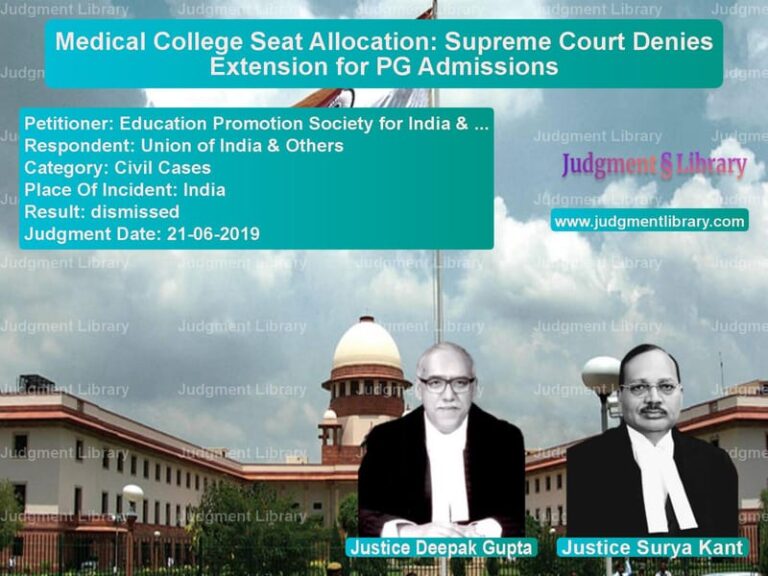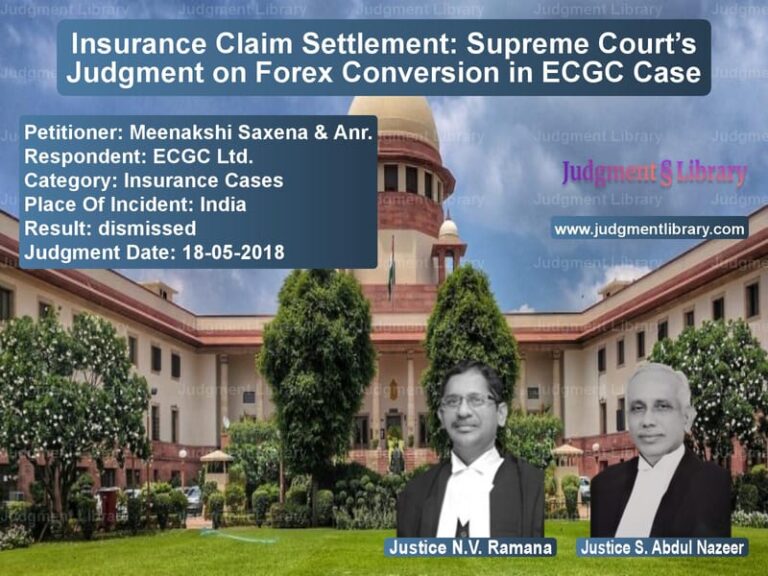Taxation of Gypsum Board Under Rajasthan VAT Act: Supreme Court’s Landmark Judgment
The Supreme Court of India recently delivered an important verdict in the case concerning the taxation of gypsum board under the Rajasthan Value Added Tax Act, 2003 (RVAT). The key question before the Court was whether gypsum board, a product primarily composed of gypsum but processed with additional materials, should be taxed under the entry for ‘gypsum in all its forms’ at 4% or should be classified under the residual category and taxed at 12.5%.
The case involved M/S. Lohiya Agencies, a trader in gypsum boards, who contested the tax authorities’ classification of the product under the general residual category attracting a higher tax rate. The Rajasthan Tax Board had ruled against them, leading them to appeal before the Rajasthan High Court, which eventually ruled in their favor. This decision was then challenged by the Rajasthan Commercial Taxes Department in the Supreme Court.
Background of the Case
Gypsum is a widely used mineral in various industries, particularly in construction. The Rajasthan VAT Act originally taxed gypsum at 4%. In 2006, an amendment expanded the scope of the specific entry to include ‘gypsum in all its forms.’ The tax authorities argued that while gypsum board contains gypsum as its main ingredient, it undergoes significant processing and should therefore be considered a separate commercial product, attracting a higher tax rate.
M/S. Lohiya Agencies, on the other hand, contended that the essence of the product remained gypsum, and it should continue to be taxed at the concessional rate of 4%.
Legal Dispute Over Tax Classification
The dispute stemmed from the fact that gypsum board is produced by subjecting gypsum to a heating process, removing water, and then compressing it between layers of paper with the addition of certain binding agents. The tax authorities insisted that this level of processing changed the fundamental nature of the product, warranting a higher tax rate.
The Rajasthan High Court ruled in favor of the traders, holding that gypsum board should be classified under ‘gypsum in all its forms’ and taxed at 4%. The state government then took the matter to the Supreme Court.
Arguments Presented Before the Supreme Court
Petitioner’s Arguments
- Gypsum board undergoes a substantial transformation in its physical and chemical properties, making it distinct from natural gypsum.
- The residual category in the tax schedule is meant for products that do not fall under any specific category, and gypsum board should be classified accordingly.
- Other states, including Maharashtra, had imposed a higher tax rate on gypsum board, and Rajasthan should follow a uniform approach.
Respondents’ Arguments
- The primary ingredient in gypsum board is gypsum, and the changes introduced through processing do not alter its essential characteristics.
- The legislative intent behind the term ‘gypsum in all its forms’ was to include all products where gypsum remains the main component.
- Judicial precedents have established that mere processing does not always create a commercially distinct product.
Supreme Court’s Observations
The Supreme Court analyzed the process involved in manufacturing gypsum board. The key consideration was whether the processing was substantial enough to make it a distinct commercial product.
In its judgment, the Court made the following observations:
- “The term ‘in all its forms’ suggests that the legislature intended to cover products like gypsum board, which retain gypsum as their main component.”
- “Merely adding binding agents and paper sheets does not change the fundamental nature of gypsum board.”
- “The interpretation of tax entries should be based on common commercial understanding, and gypsum board is commonly recognized as a gypsum-based product.”
Final Verdict
The Supreme Court ruled in favor of the respondent, holding that gypsum board falls under ‘gypsum in all its forms’ and should be taxed at 4%. The court emphasized that the subsequent amendment in 2014, which created a separate tax entry for gypsum board at 12.5%, could not be applied retrospectively.
The key takeaways from the verdict include:
- Businesses dealing in gypsum-based products now have clarity regarding the applicable tax rates.
- The ruling reinforces the principle that minor processing does not necessarily result in a separate commercial product for taxation purposes.
- Future legislative amendments will need to be explicitly framed to avoid such ambiguities.
Impact of the Judgment
The Supreme Court’s ruling is expected to have a significant impact on taxation policies across various states. Several businesses had been facing uncertainty regarding the classification of processed goods, and this decision provides much-needed clarity.
By reaffirming the principle that products with minimal processing should not automatically be treated as distinct commodities, the ruling helps prevent arbitrary tax classifications.
Petitioner Name: The Additional Commissioner (Legal), Commercial Taxes, Rajasthan.Respondent Name: M/S. Lohiya Agencies.Judgment By: Justice Ranjan Gogoi, Justice Sanjay Kishan Kaul, Justice K. M. Joseph.Place Of Incident: Rajasthan.Judgment Date: 08-01-2019.
Don’t miss out on the full details! Download the complete judgment in PDF format below and gain valuable insights instantly!
Download Judgment: The Additional Commi vs MS. Lohiya Agencies Supreme Court of India Judgment Dated 08-01-2019.pdf
Direct Downlaod Judgment: Direct downlaod this Judgment
See all petitions in Income Tax Disputes
See all petitions in GST Law
See all petitions in Tax Evasion Cases
See all petitions in Tax Refund Disputes
See all petitions in Customs and Excise
See all petitions in Judgment by Ranjan Gogoi
See all petitions in Judgment by Sanjay Kishan Kaul
See all petitions in Judgment by K.M. Joseph
See all petitions in dismissed
See all petitions in supreme court of India judgments January 2019
See all petitions in 2019 judgments
See all posts in Taxation and Financial Cases Category
See all allowed petitions in Taxation and Financial Cases Category
See all Dismissed petitions in Taxation and Financial Cases Category
See all partially allowed petitions in Taxation and Financial Cases Category







